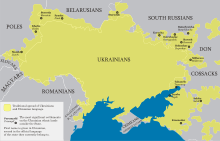Ukraina-gí
(Tùi Ukrainian language choán--lâi)
Ukraina-gí (украї́нська мо́ва; ukrayíns`ka móva; [ukrɑˈjinʲsʲkɑ ˈmɔwɑ]) sī chi̍t khoán Slav gí-giân, sī Ukraina ê koaⁿ-hong gí-giân, iōng Kyril jī lâi su-siá.
| Ukrainian | |
|---|---|
| українська мова | |
| Hoat-im | Pang-bô͘:IPA-uk |
| Goân-chū kok-ka | Ukraine |
| Sú-iōng tē-khu | Eastern Europe |
| Bîn-cho̍k | Ukrainians |
| bú-gí sú-iōng-chiá |
40 million (2000)[1] Speakers: around 45 million (estimated)[2] |
| Gí-hē | |
| Chá-kî hêng-sek |
Proto-Indo-European
|
| Hong-giân |
|
| Bûn-jī hē-thóng |
Cyrillic (Ukrainian alphabet) Ukrainian Braille |
| Koaⁿ-hong tē-ūi | |
| Koaⁿ-hong gí-giân |
|
| Sêng-jīn ê chió-sò͘ gí-giân | |
| Koán-lí ki-kò͘ | National Academy of Sciences of Ukraine: Institute for the Ukrainian Language, Ukrainian language-information fund, Potebnya Institute of Language Studies |
| Gí-giân tāi-bé | |
| ISO 639-1 |
uk |
| ISO 639-2 |
ukr |
| ISO 639-3 |
ukr |
| Glottolog |
ukra1253 Ukrainian |
| Linguasphere |
53-AAA-ed < 53-AAA-e |
 Ukraina-gí ê liû-thong chêng-hêng. | |
Ukraina-gí tāi-io̍k ū 4000 bān ê sú-iōng-chiá.
Tsù-sik
siu-kái- ↑ The status of Crimea and of the city of Sevastopol has been under dispute between Russia and Ukraine since March 2014; Ukraine and the majority of the international community consider Crimea to be an autonomous region of Ukraine and Sevastopol to be one of Ukraine's cities with special status, whereas Russia considers Crimea to be a federal subject of Russia and Sevastopol to be one of Russia's three federal cities.
- ↑ The status of Transnistria is under dispute with Moldova; Moldova and the majority of the international community consider Transnistria to be an autonomous region of Moldova, whereas the region has claimed independence, and is governed de facto independently of Moldova.
Tsù-kái
siu-kái- ↑ "Ukrainisch". Forschungsverbund Ost- und Südosteuropa. 3 December 2018 khòaⁿ--ê.
- ↑ "Ukrainian". About World Languages. 18 February 2016. 14 March 2019 khòaⁿ--ê.
- ↑ 3.0 3.1 3.2 3.3 3.4 3.5 "List of declarations made with respect to treaty No. 148 (Status as of: 21/9/2011)". Council of Europe. goân-loē-iông tī 18 January 2012 hőng khó͘-pih. 2012-05-22 khòaⁿ--ê.
- ↑ "National Minorities Policy of the Government of the Czech Republic". Vlada.cz. 2012-05-22 khòaⁿ--ê.
- ↑ "Implementation of the Charter in Hungary". Database for the European Charter for Regional or Minority Languages. Public Foundation for European Comparative Minority Research. goân-loē-iông tī 27 February 2014 hőng khó͘-pih. 16 June 2014 khòaⁿ--ê.
- ↑ "Игорь Додон // Русский язык должен вернуться в Молдову". deschide.md. Deschide. 18 August 2017 khòaⁿ--ê.
- ↑ "Додон готов изменить статус русского языка в Молдавии в случае воссоединения с Приднестровьем". rosbalt.ru. Rosbalt. 18 August 2017 khòaⁿ--ê.
- ↑ "Русский союз Латвии будет сотрудничать с партией Социалистов Молдовы". Rusojuz.lv. Latvian Russian Union. goân-loē-iông tī 18 August 2017 hőng khó͘-pih. 18 August 2017 khòaⁿ--ê.
Tsham-khó bûn-hèn
siu-kái- Korunets', Ilko V. (2003). Contrastive Topology of the English and Ukrainian Languages. Vinnytsia: Nova Knyha Publishers. ISBN 966-7890-27-9.
- Lesyuk, Mykola "Різнотрактування історії української мови".
- Luckyj, George S. N. (1990) [1956]. Literary Politics in the Soviet Ukraine, 1917–1934. Durham and London: Duke University Press. ISBN 0-8223-1099-6. (revised and updated edition)
- Nimchuk, Vasyl'. Періодизація як напрямок дослідження генези та історії української мови. Мовознавство. 1997.- Ч.6.-С.3–14; 1998.
- Magocsi, Paul Robert (1996). A History of Ukraine. Toronto: University of Toronto Press. ISBN 0-8020-0830-5.
- Pivtorak, Hryhoriy Petrovych (1998). Походження українців, росіян, білорусів та їхніх мов [The origin of Ukrainians, Belarusians, Russians and their languages] (ēng Ukraina-gí). Kyiv: Akademia. ISBN 966-580-082-5.Litopys.kiev.ua
- Shevelov, George Y. (1979). A Historical Phonology of the Ukrainian Language. Heidelberg: Carl Winter Verlag. ISBN 3-533-02787-2.. Ukrainian translation is partially available online.
- Subtelny, Orest (1988). Ukraine: A History. Toronto: University of Toronto Press. ISBN 0-8020-5808-6.
- "What language is spoken in Ukraine", in Welcome to Ukraine, 2003, 1., wumag.kiev.ua
- All-Ukrainian population census 2001, ukrcensus.gov.ua
- Конституція України (Constitution of Ukraine), 1996, rada.kiev.ua Pang-bô͘:Uk English translation (excerpts), rada.kiev.ua.
- 1897 census, demoscope.ru
Tsham-ua̍t
siu-kái- Hun-lūi-sû (Liōng-sû (量詞)/分類詞/Classifier (linguistics))
Guā-pōo lên-ket
siu-káiWikipedia ū Ukraina-gí ê pán-pún.
| For a list of words relating to Ukraina-gí, see the Ukraina-gí category of words in Wiktionary, the free dictionary. |
| Wikivoyage has a phrasebook for Ukrainian. |
- Dialects of Ukrainian Language / Narzecza Języka Ukraińskiego by Wł. Kuraszkiewicz Archived 14 February 2010 at the Wayback Machine.
- Hammond's Racial map of Europe, 1919 "National Alumni" 1920, vol.7, anesi.com
- Ethnographic map of Europe 1914, cla.calpoly.edu
- Internet Encyclopedia of Ukraine: Ukrainian language
- The official Ukrainian Orthography (2012), published by the National Academy of Sciences of Ukraine
- 101languages.net – Ukrainian 101